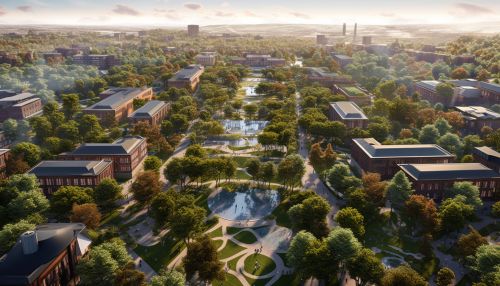Brigham Young University
History
Brigham Young University (BYU) is a private research university located in Provo, Utah. It was established on October 16, 1875, by Brigham Young, the second president of The Church of Jesus Christ of Latter-day Saints (LDS Church). The university's history is deeply intertwined with the development of the LDS Church and the expansion of the Latter-day Saint movement in the United States.


The university started as Brigham Young Academy, a small school offering elementary education. Over the years, it expanded its curriculum and became a full-fledged university, offering a wide range of undergraduate and graduate programs. The university's growth was marked by numerous challenges, including financial difficulties, political controversies, and natural disasters. Despite these challenges, the university has grown into one of the largest and most respected religious universities in the United States.
Academics
BYU offers a comprehensive range of academic programs, including 179 undergraduate majors, 62 master's programs, and 26 doctoral programs. The university is organized into 11 colleges, each of which is responsible for a specific area of study. These colleges include the College of Life Sciences, College of Humanities, College of Engineering, and College of Fine Arts and Communications, among others.
The university is known for its rigorous academic standards and commitment to integrating faith and learning. All students are required to take religious education courses as part of their degree programs. The university's academic programs are accredited by the Northwest Commission on Colleges and Universities.
Campus
The BYU campus is located in Provo, Utah, a city situated in the Utah Valley. The campus covers an area of approximately 560 acres and includes more than 300 buildings. The campus is known for its beautiful setting, with views of the nearby Wasatch Mountains and Utah Lake.
The campus includes a variety of facilities, including academic buildings, residence halls, a library, a museum of art, and athletic facilities. The campus is also home to the BYU Broadcasting building, which houses the university's television and radio stations.
Student Life
BYU has a vibrant student life, with a wide range of extracurricular activities and student organizations. The university's student body is diverse, with students from all 50 U.S. states and more than 100 countries. The university's student life is heavily influenced by the LDS Church, with a strong emphasis on service, community, and spiritual development.
All students at BYU are required to adhere to the university's Honor Code, which includes standards of honesty, integrity, and morality. The Honor Code also includes standards of dress and grooming, and prohibits the use of alcohol, tobacco, and illegal substances.
Athletics
BYU is a member of the National Collegiate Athletic Association (NCAA) and competes in the West Coast Conference. The university's athletic teams, known as the Cougars, compete in a variety of sports, including football, basketball, baseball, and track and field.
The university's athletic programs have a long history of success, with numerous conference championships and national titles. The university's football team, in particular, has a strong tradition, with a national championship in 1984 and a Heisman Trophy winner in 1990.
Notable Alumni
BYU has produced a number of notable alumni in various fields, including business, politics, academia, and entertainment. These include former U.S. presidential candidate Mitt Romney, author and motivational speaker Stephen R. Covey, and Academy Award-winning animator Don Bluth.
